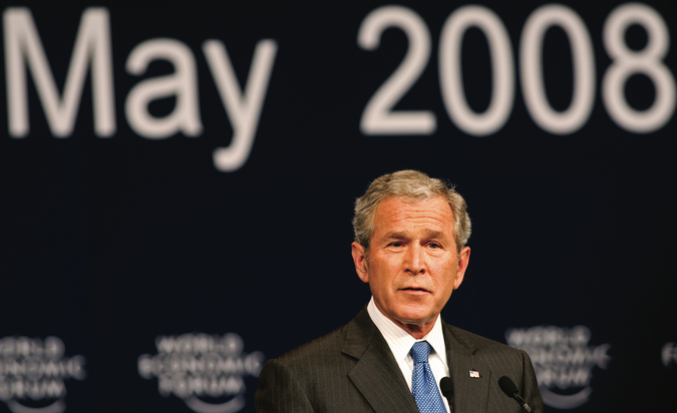The theme of this year’s World Economic Forum – Middle East, which just ended in the Egyptian Red Sea resort of Sharm el-Sheikh, was “Learning from the Future.” Prominent business leaders, media representatives, educators, and politicians, including 12 world leaders, descended on the tip of the Sinai to engage in three days of meetings, lectures, and workshops.
The Forum, founded by Prof. Klaus Schwab in 1971 was established to gather influential leaders together for the sole purpose of improving the state of the world “by engaging leaders in partnerships to shape global, regional and industry agendas.” The need for the Economic World Forum seems more relevant today than when it was first established in the early 1970s.
When one thinks about it, the Sinai Peninsula is the perfect venue to host such a forum. According to Judaeo-Christian tradition, it was here that Moses received the Ten Commandments. Whether one believes in the higher authority from whence these laws came or not, most societies are partly governed by them.
In many ways, the Sinai Peninsula is more than just a venue for biblical miracles; its stunning beauty spans from its high mountains to below the surface of the sea. Many plants and animals inhabiting this peninsula are only found here. Shortly after the peace deal was signed between Israel and Egypt, a group of environmentalists had their own agenda for the Sinai: they sent out a petition to make that the entire peninsula would be turned into a world protectorate. In the end, only seven areas were given protectorate status, notably Ras Mohammed at the very tip of Sinai and Saint Catherine’s heritage area.
While driving down to the Forum I couldn’t help but reflect back to the first time I visited Sinai in the early 1980s. At that time, the Israelis had already given most of the peninsula back to the Egyptians, but the signs of the former enemies’ turbulent relationship could be seen everywhere. Gutted half- buried tanks and transport vehicles littered the sand on either side of the road; weathered signs written in Hebrew flapped in the wind and markers that warned people of mines dotted the landscape. The only people who ventured into the Sinai were divers in search of untapped reefs and mountaineers with their sights on another summit.
Sinai has come a long way, as now it is one of the top destinations in the world for tourists and every two years plays host to the World Economic Forum – Middle East.
From the first day, the Forum looked like it was going to be consumed with the Israeli-Palestinian peace process. Fresh from witnessing the 60th anniversary celebrations in Israel, U.S. President George Bush immediately went on the offensive, praising countries around the world like Poland, the Philippines, Korea, Chile and Indonesia for their ability to overcome tyrannical regimes and become thriving democracies. He also praised the achievements of many countries in the Middle East for opening up their markets, practicing free trade, and giving women an equal voice.
But his overall message was that there was still much that needed to be done, particularly when it came to political reforms and giving the voices of opposition the freedom to speak. For the most part, the first half of his speech was received positively. However, when he went on to address the Palestinian-Israeli peace process and terrorism there was nothing new, just more of the same well-rehearsed rhetoric he has repeated so many times in the past. He made his usual reference to the leaderships of both Iran and Syria referring to them as “spoilers”. Both Egypt’s President Hosni Mubarak and King Abdullah of Jordan echoed Bush’s call for a comprehensive peace deal leading me to believe this would be the overriding theme of the forum.
However, away from the big political speeches the forum was taking on another dimension, that of the lessons which can be learned from the future. It was refreshing to hear discussions on what to do about the rising cost of oil and the effects it has on the region and beyond. Also, there was this underlining current of wanting change and looking to renewable clean energy as an alternative in the near future. Even business representatives from the Gulf countries, whose booming economies are fueled by the high cost of energy, were positive in their approach to seeking out alternative, cleaner sources of energy.
Another topic that dominated many of the discussions was education. The idea that still too many young are left behind due to lack of access to decent schooling was at the forefront of many of the seminars. And the notion that both business leaders and politicians must work together to insure that the skills they learn today will match the jobs that will be needed in the future was one of the positive conclusions of the Forum. In the closing session, a number of students were brought in to sit on the panel with the big guns including Schwab, Egyptian Prime Minister Ahmed Nazif, Wikipedia founder Jimmy Wales, and female Member of the Japanese House of Representatives Yuriko Koike. The move to include students with such high-profile leaders was a sign of the changing times and the pressing need to listen to what the next generation has to say.
During the closing session Schwab made sure to include the entire panel in the discussion. When he asked Amira Abdel-Aziz, a masters student at Cairo University, to comment she turned to her own Prime Minister and said, “The relationship between government and people has to change … We have to look at the people as the highest authority.”
Norbert Schiller is a Dubai-based photo-journalist and writer.






